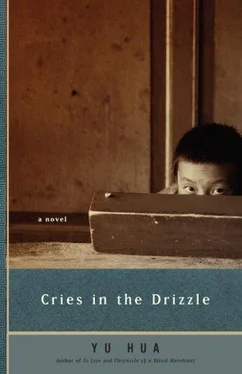Unusually, on one occasion, she did not ask me to call her “Grannie” and instead ushered me in with a mysterious smile. It turned out that Guoqing was not at home, and as I nervously came back down the stairs the old lady pounced on me the way a cat pounces on a bird. She took my hand and led me into her room. Her moist palm made me tremble, but I was too petrified to put up any resistance.
Her room, as it turned out, was bright and spotlessly clean. Many framed pictures hung on the wall, black-and-white photographs of old men and women, not one of whom was smiling. She said to me in a whisper, “They're all dead.”
She seemed to be speaking quietly for fear they might hear, and I hardly dared breathe. She pointed at a gentleman with a long wispy beard and said, “There's a good man. He came to visit me just last night.”
A dead man came to see her? I started to cry. She was not pleased and told me disapprovingly, “That's nothing to cry about.”
Pointing at another photograph, she said, “Now, her, she doesn't dare come to see me. She stole my ring, and now she's worried I'm going to ask for it back.”
This old woman who cuts such a daunting figure in my childhood memory would not let me leave that spooky room of hers until she had introduced the people in the pictures to me one by one. I never dared visit Guoqing's home again. Even if he was there to keep me company, I didn't want to have anything to do with this eerie old lady. Only much later did I realize there was actually nothing to fear from her. She was simply immersed in an isolation unfathomable to me at my age. She straddled the boundary between life and death, forsaken by both.
How amazed I was to see things so far away, that first time I went up to the second story of Guoqing's house. It was as though distance had shrunk and I suddenly had the whole world at my feet. Like the hills in the distance, fields spread out as far as the eye could see, and the tiny moving figures made me chuckle with delight. For the first time I truly understood the meaning of the word limitless.
Guoqing was an organized child. His clothes were always clean, and the little handkerchief he kept in his pocket was folded into a perfect square. When we lined up for physical education, he would delicately remove his handkerchief and wipe his mouth. I was very struck by that well-practiced action of his, because if I had a runny nose I was more than likely to let my shirt get stained. What is more, he had his own medical kit, just like a doctor — a small cardboard box containing five vials in a neat row. When he took the bottles out and explained their various applications, this boy of eight was the embodiment of carefulness and gravity, and in my impressionable eyes he seemed more like a distinguished medical practitioner than a boy my own age. He took his vials everywhere, and sometimes, just as he was running across the school playground, he would come to an abrupt halt and gesture to me that it was time to take a pill. So I would go into the classroom with him and watch him take the medicine kit out of his satchel, extract a tablet from a vial, and put it in his mouth. He could swallow it dry.
Guoqing's father I found intimidating. If he wasn't feeling well, he would turn to his son for a consultation. My classmate was invigorated on such occasions: he spoke with eloquence, in his piping voice, quizzing his father on every aspect of his ailment. Only when his father interrupted him would he break off questioning and open his sacred box with an expert flick. His hand would hover above the five vials and select the medication required. As he handed the medicine over, he would lose no time in asking his father for five cents. On one such occasion, his father was about to go and get the money, but Guoqing quickly handed him a glass of water, considerately letting his father take the medicine while he went over and stuck a hand into the pocket of the jacket that his father had thrown on the bed. Taking his hand out, he showed his father a five-cent coin, which he then deposited in his own pocket. But then, as we set off together for school, he dug out of his pocket two five-cent coins. Guoqing was a generous boy; he told me that he had taken the other five cents for me. Then he carried out his promise to buy us both an ice.
I never knew Guoqing's mother. Once the three of us were playing on top of the old town wall, waving willow branches and running on the yellow earth, enacting an imaginary battle, war whoops and all. Afterward we sat down in exhaustion, and Liu Xiaoqing suddenly asked about her. “She went to heaven,” Guoqing said.
Then, pointing at the sky, he said, “The Lord of Heaven is watching us.”
At that moment the sky was so blue it seemed unfathomably deep. Heaven was watching us. We three children were enveloped in a huge emptiness, and deep within me I gave a deferential shudder, for the endless sky left me no place to hide. I heard Guoqing go on, “Whatever we are doing, the Lord of Heaven can see it as clear as anything. Nobody can put one over on him.”
Xiaoqing's random inquiry about Guoqing's mother left me in awe of heaven — my earliest experience of a self-imposed constraint. Even now I sometimes have the sensation that I am being followed by a pair of eyes and have no safe haven, my secrets far from secure, but in danger of exposure at any moment.
In second grade Guoqing and I had a fierce argument triggered by the following question: if one tied together all the atom bombs on earth and detonated them, would the world be blown to pieces? It was Liu Xiaoqing who got us going on this, because he was the one who had the idea of roping all the atom bombs together, an idea that makes me smile when I think about it now. I clearly remember how Liu Xiaoqing looked when he said this: he broached the issue just after sniffing up a thread of mucus that was threatening to dribble into his mouth. He sniffed so loudly I could practically feel the snot slithering smoothly back inside his nose.
Guoqing agreed with Liu Xiaoqing, arguing that the world, or at the very least a big chunk of it, would surely be blown to pieces. We would be whipped all over the place by incredible gale-force winds, amid a terrible howling noise. Just like our physical education instructor, who had a hole in his nose — when he talked there was a wheezing sound, like the roar of the north wind.
I didn't believe that the world would be destroyed by the explosion; in fact I didn't even think there would be such a big crater. My reasoning was: atom bombs are made from things found in the world, and the world is bigger than atom bombs. How could something that's so big possibly be blown up by something that's so small? Carried away by the force of my argument, I put it to Guoqing and Liu Xiaoqing, “Can you beat your dads in a fight? No way! That's because you're their sons. You're small, and your dads are big.”
Neither side could persuade the other, so we went to see Zhang Qinghai, the schoolmaster who knitted, hoping that he would serve as an impartial judge. This was during lunch break in the winter, and our teacher was sitting against the wall, sunning himself. His knitting hands flitted back and forth, as nimble as a woman's. Squinting in the sun, he listened as we presented our cases and then admonished us, “That's impossible. The peoples of the world are peace loving. How could they possibly tie atom bombs together and detonate them?”
We had been arguing about science, but he gave us an answer rooted in politics. So we had no choice but to continue our argument, which soon deteriorated into personal attacks. I said to them, “You don't know shit!”
“You don't know shit!” they fired back.
I was so angry I didn't know what I was doing, and I issued a most impractical threat. I said, “I am not going to have anything to do with you two from now on!”
Читать дальше












